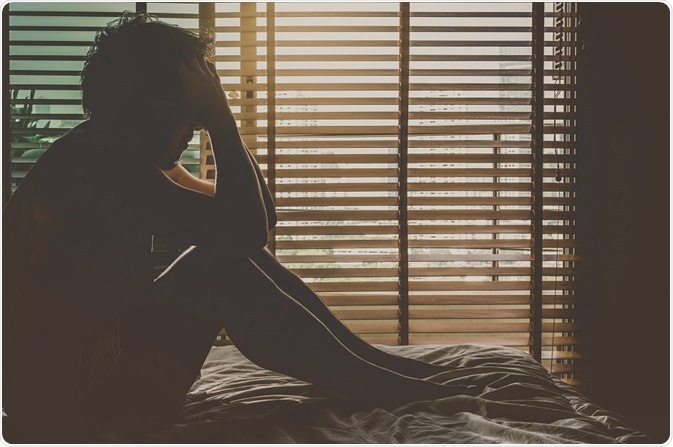
Agoraphobia Signs and Symptoms
Agoraphobia is a psychological disorder characterized by a fear of public places or of going outside of the home. The symptoms of agoraphobia fall into three broad categories:
- Physical
- Cognitive
- Behavioral

Credit: TZIDO SUN/ Shutterstock.com
Physical symptoms
Physical symptoms of agoraphobia resemble those of an anxiety or panic attack. Those could include:
- Shortness of breath: Trouble breathing due to anxiety is one of the most common symptoms of an anxiety attack. It is usually caused by hyperventilation. Hyperventilation creates a sensation of not getting enough oxygen, but is actually characterized by taking too deep breaths too fast. People usually respond by trying to take still deeper breaths, which exacerbates the problem. This can lead to additional symptoms such as lightheadedness, chest pain, weakness in the legs, and rapid heartbeat. This symptom can be alleviated through deliberately adopting slow, calm breathing.
- Chest pain: Anxiety due to claustrophobia can cause chest pain, which can be difficult to distinguish from a serious heart problem. Chest pain can be caused by a number of different aspects of anxiety. Hyperventilation can cause chest pain (see above). Chest pain can also be psychosomatic, meaning that the sensation of pain is created by the anxiety.
- Trembling or shaking: An activated fight or flight system floods the body with adrenaline (epinephrine), causing the body to shake or tremble. Deep, slow breathing can help calm trembling. As well, releasing the energy through exercise or yelling can reduce shaking and trembling.
- Lightheadedness: Feeling dizzy or lightheaded during an anxiety episode is usually due to hyperventilation. Calm breathing, exercise, and water can help with a feeling of lightheadedness.
- Sweating: Sweating is a reaction to hormones released during a fight or flight response. It is a normal and very common response to fear. While sweating can be unpleasant, it is not dangerous. Sweating can’t be stopped directly, but calming activities can reduce the fear response leading to less sweating.
- Nausea: Nausea is caused by a release of adrenaline, disrupting the balance of acids in the stomach. Anxiety can also shut down the digestion of food.
Cognitive symptoms
Cognitive symptoms of claustrophobia relate to thoughts about the situation or symptoms. Some of those thoughts might be:
- Fear of embarrassment in front of others
- Fear of dying or suffocating
- Being unable to escape in the event of a panic attack
- Fear of Insanity
- Fear of losing control
- Fear of attracting attention
- Worry about being unable to function or survive alone
- General anxiety or dread
Behavioral Symptoms
Agoraphobia leads to certain characteristic behavior patterns. Some behaviors associated with agoraphobia are:
- Avoidance of triggering situations like crowded places and public transit
- Not being able to leave the house
- Needing a trusted companion when you go out
- Avoidance of travel
When to see a doctor
It is a good idea to see a doctor if you have signs or symptoms of agoraphobia. Certain symptoms warrant immediate medical attention because they could indicate a more serious condition. Seek medical attention immediately if you have:
- Chest pain
- Shortness of breath
- Headaches
- Dizziness
- Fainting
- Weakness
- Irregular heartbeat
- Depression
- Thoughts of suicide or harming yourself
Sources
- NHS Choices, Symptoms of Agoraphobia, https://www.nhs.uk/Conditions/Agoraphobia/Pages/Symptoms.aspx
- Anxietycentre.com, Anxiety symptoms, http://www.anxietycentre.com/anxiety-symptoms.shtml
- CalmClinic, All Possible Symptoms of Anxiety-The Anxiety Guide, https://www.calmclinic.com/anxiety/signs/irrational-thoughts
- Fears, phobias, and preparedness: toward an evolved module of fear and fear learning, https://www.ncbi.nlm.nih.gov/pubmed/11488376
- Anxietycentre.com, Panic attack symptoms, causes, treatment, statistics, http://www.anxietycentre.com/panic-attack-symptoms.shtml
Further Reading
Last Updated: May 23, 2019

































No hay comentarios:
Publicar un comentario